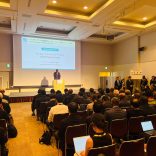TICAD | Mozambique: President open to Japanese investment that benefits Africa
Mozambique: State business sector companies lack transparency, some bankrupt – NGO

in file CoM
An analysis by the Centre for Public Integrity (CIP), a Mozambican non-governmental organisation (NGO), considers the state’s business sector to lack transparency and to be unsustainable, with some companies technically bankrupt “The sector as a whole is not financially sustainable” and “a significant part of the companies that make it up depend on State interventions for their survival,” reads the fiscal risk analysis [ [on the State’s Business Sector] released to the media by CIP.
At stake are 38.7 billion meticais (619 million euros) in guarantees and sovereign bonds that have allowed companies to fund themselves and which represent a risk to public debt.
Strengthening the supervision and management of the state’s business sector companies (SEE) and improving control of public debt are commitments made by the Mozambican government to the International Monetary Fund (IMF) as part of the financial assistance programme worth US$470 million (roughly the same amount in euros) until 2025.
The state has announced measures, but the CIP study indicates that a “lack of transparency, the absence of a guiding framework for remuneration of board members” and a lack of “reliable feasibility studies” prevail.
“Transparency is the basis for reducing exposure to corruption,” it stresses.
On the other hand, the document warns about “the risk associated with the lack of clarity in the process of restructuring the SEE,” which can create space “for the State’s dependence on the private sector.
The NGO analysed the public accounts of eight companies that account for over 90 percent of the SEE and concluded that those that contributed most to the deterioration in the sector’s performance were Mozambique Airlines (LAM), telecommunications company Tmcel – both classified as technically insolvent – Aeroportos de Moçambique (AdM), oil company Petromoc, Eletricidade de Moçambique (EDM) and Empresa Nacional de Hidrocarbonetos (ENH).
“However, ENH’s risk is associated to the high investments for its participation in gas projects in the Rovuma Basin,” the document noted.
With the exception of ENH, the remaining companies “do not have the capacity to meet their financial obligations to creditors” and “their balance sheets do not allow them to obtain funding from commercial banks without the State issuing a guarantee.
Not counting ENH, the public companies under analysis “held, by the end of the 2021 financial year, around 38.7 billion meticais (619 million euros) in sovereign guarantees and sovereign bonds, implying that the State should be prepared to take on these obligations,” putting pressure on public debt.
Of the eight companies analysed, only Hidroelétrica de Cahora Bassa (HCB – Cahora Bassa Hydroelectric Power Station) and Portos e Caminhos de Ferro de Moçambique (CFM – Ports and Railways of Mozambique) have a “very low” (Category 1) and “low” (Category 2) fiscal risk, respectively – meaning they are able to honour their commitments to creditors.
The results of the CIP study “show that the SEE is a fragile sector and dependent on financial resources from the state” in the form of “subsidies, treasury support, debt redemption (payment of debt service), capital injections,” amongst others.
The memorandum signed with the IMF stipulates that the Institute for Management of State Holdings (IGEPE) will publish by the end of the year a report on the 2020 consolidated accounts of SEE companies, which will then be subject to an external audit.
- To read, download the full CIP analysis, in Portuguese, please click HERE.













Leave a Reply
Be the First to Comment!
You must be logged in to post a comment.
You must be logged in to post a comment.